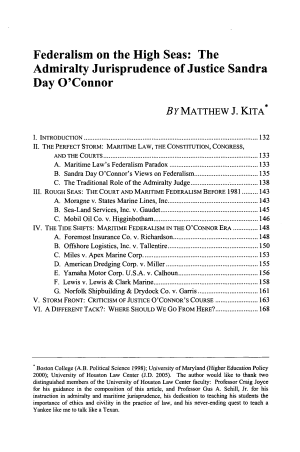Federalism on the High Seas: The Admiralty Jurisprudence of Justice Sandra Day O'Connor
January 1, 2005

DISCLAIMER: This text has been transcribed automatically and may contain substantial inaccuracies due to the limitations of automatic transcription technology. This transcript is intended only to make the content of this document more easily discoverable and searchable. If you would like to quote the exact text of this document in any piece of work or research, please view the original using the link above and gather your quote directly from the source. The Sandra Day O'Connor Institute does not warrant, represent, or guarantee in any way that the text below is accurate.
Article Text
(Excerpt, Automatically generated)
Federalism on the High Seas: The Admiralty Jurisprudence of Justice Sandra Day O'Connor
BYMATTHEW J. KITA*
INTRODUCTION 132
THE PERFECT STORM: MARITIME LAW, THE CONSTITUTION, CONGRESS, ANDTHECOURTS 133
Maritime Law's Federalism Paradox 133
Sandra Day O'Connor's Views on Federalism 135
The Traditional Role of the Admiralty Judge 138
ROUGH SEAS: THE COURT AND MARITIME FEDERALISM BEFORE 1981 143
Moragne v. States Marine Lines, Inc 43
Sea-Land Services, Inc. v. Gaudet 145
Mobil Oil Co. v. Higginbotham 146
THE TIDE SHIFTS: MARITIME FEDERALISM IN THE O'CONNOR ERA 148
Foremost Insurance Co. v. Richardson 148
Offshore Logistics, Inc. v. Tallentire 150
Miles v. Apex Marine Corp 153
American Dredging Corp. v. Miller 155
Yamaha Motor Corp. U.S.A. v. Calhoun 156
Lewis v. Lewis & Clark Marine 158
Norfolk Shipbuilding & Drydock Co. v. Garris 161
STORM FRONT: CRITICISM OF JUSTICE O'CONNOR'S COURSE 163
A DIFFERENT TACK?: WHERE SHOULD WE Go FROM HERE? 168
Boston College (A.B. Political Science 1998); University of Maryland (Higher Education Policy 2000); University of Houston Law Center (J.D. 2005). The author would like to thank two distinguished members of the University of Houston Law Center faculty: Professor Craig Joyce for his guidance in the composition of this article, and Professor Gus A. Schill, Jr. for his instruction in admiralty and maritime jurisprudence, his dedication to teaching his students the importance of ethics and civility in the practice of law, and
